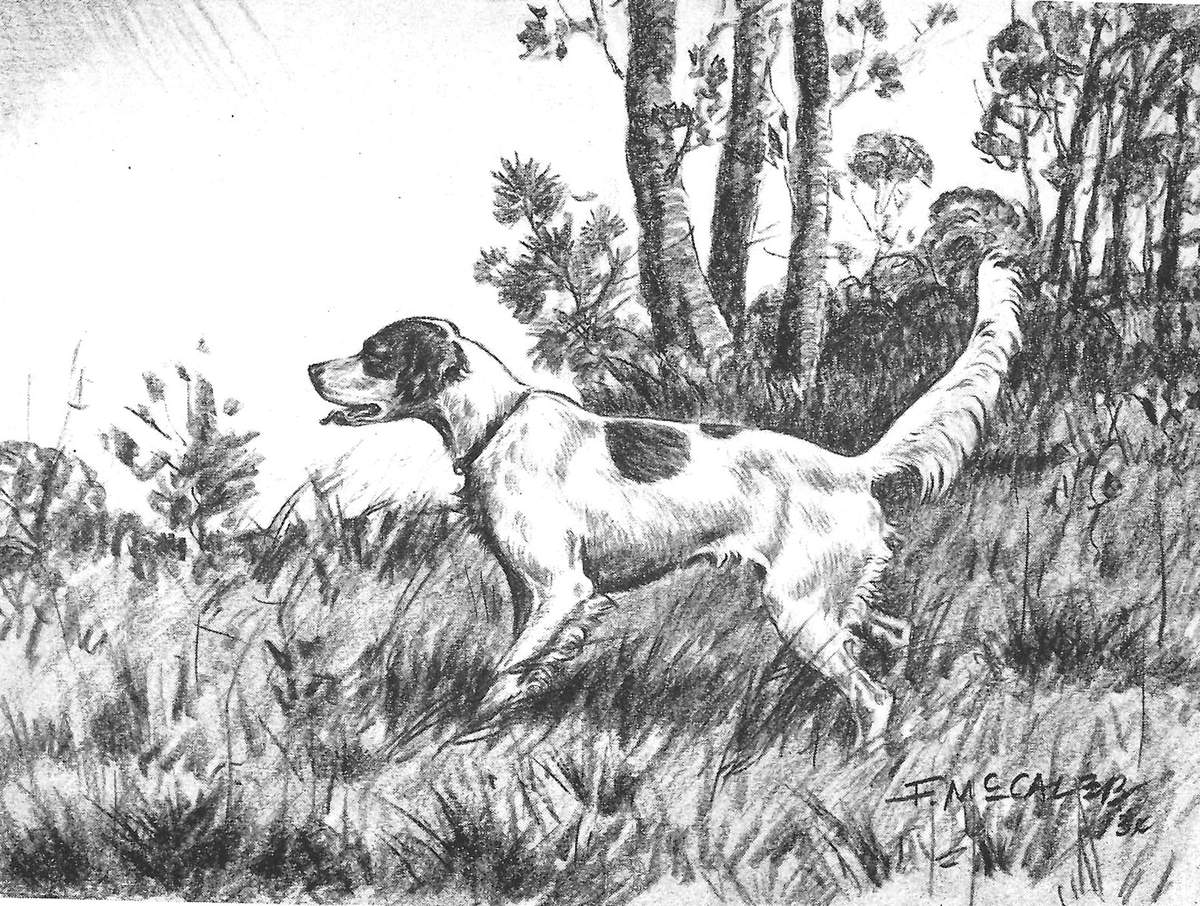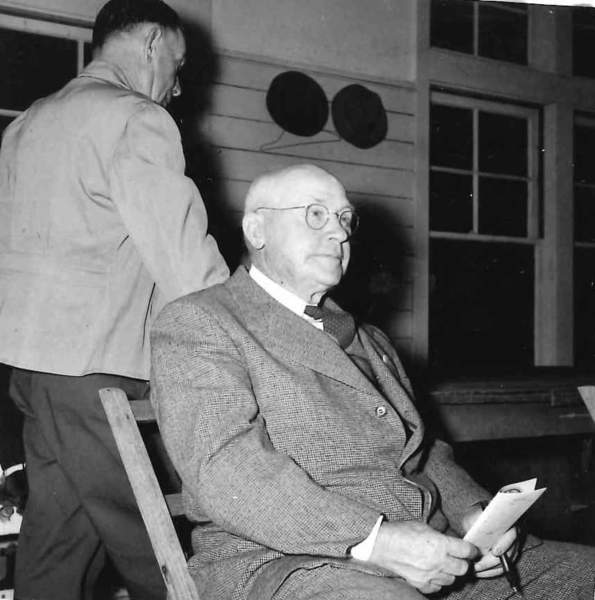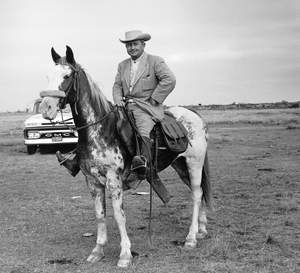Result: A Flashback -- Profile from the Past Champion Buddy D
Post Date: Mar 23, 2022
Submitted By: Albert F. Hochwalt |

Buddy D
In the companion volume (1935) to the 1923 edition of "The Modern Setter," A. F. Hochwalt devotes a chapter to Champion Buddy D, same the above headline. While Buddy D is the noted central focus of the chapter, there is a second and at times in Hochwalt's writing an equally important character--Buddy's owner, Carl E. Duffield.
Hochwalt's admiration of Duffield, his dedication to the setter breed, his determination and perseverance in developing top flight field trial contenders shines through brightly.
Buddy D was no great influence on the setter breed, with five total placements and no record of winning offspring. But Duffield's efforts, as an amateur trainer-handler, to earn those placements with Buddy is the story. (The following has been edited and abridge from the original text.)
* * *
"WE can attain anything we desire if we wish for it ardently enough."
This thought has been expressed in various forms all through the ages. But the wise man realizes that with this thought must be action and perseverance.
Although the adage tells us that "everything comes to him who waits," Carl E. Duffield, Oklahoma and Texas oil operator, believed in going out to meet the opportunities and not waiting for the to catch up to him. That was the keynote to his business success and that may be taken as the principal reason he was successful with setters.
His great delight was spending his vacations with his dogs and whether he trained them in Oklahoma, in Texas or in Canada, he entered into his work with heart and soul.
We all know the great success he had with Candy Kid, the dog that won the prairie championships three times, the National Free-for-All and a number of important all-age stakes. We know also that Carl Duffield never swerved from his path in the love he had for the setter during all the since Candy Kid won his last prairie championship in 1918 (this was written in 1935, seventeen years later). He is an amateur but one of the most diligent developers of setters the country has ever seen.
In the days of Candy Kid he entrusted his dogs to professional handlers (e.g. Ches Harris), and was content to follow along the sidelines and see them pilot his favotieres to victory. That day has long passed; now he is satisfied only when he can handle his own dogs in the keenest of competition.
In 1934 when the talk went the rounds that the setter must be brought back, he made the classic statement: "The setter has no need to be brought back. He was never away." His abiding faith in the breed, his never-say-die spirit, his eager aggressiveness, his keen powers of perception and technique that is strictly his own, are his stock and trade and makes use of them all whether training his dogs or in actual competition.
Another great asset is a son now growng into young manhood who is as keenly interested in dogs as he is himself. Carl Junior is still going to school and during the year he is kept busy with his studies; consequently he does not have much opportunity in taking part in the winter training, but when vacation time comes the lure of the prairie is as insistent with him as it is with his father.
In the summer of 1933, the twosome spent the entire season on the prairies where they not only devoted days to active training but benefitted from the life in the open spaces. That season did not net them much in in the way of actual winnings, but it proved to be a marvelous experience for Carl Junior.
Buddy D came into competition that year practically unknown; indeed, at that period Buddy was not even registered, but those who saw him felt here was a setter of magnificent potentialities.
Carl Duffield ran his dogs later in the season in the various quail trials of the Southwest and won places every now and then, but Buddy was not yet a finished dog at the time. Later in the season he took his dogs to Shuqualak, Mississippi where in the National Free-for-All Buddy ran a heat in which found more birds in that qualifying heat than any other dog in the stake. It was Duffield's over-eagerness in not allowing the dog make his own casts that probably had much to do with Buddy not being called back for the final three hours.
In the summer of 1934, Carl Duffield started for Canada again and took up quarters in a region around Moose Jaw, Saskatchewan where birds were plentiful in that area despite the drought and difficult conditions that existed farther south in the province. His string of dogs consisted of Buddy D, Black Hawk Kid, Jake's Jack Mohawk, Crabtree's Tailwind, and a Derby, Ewing's Gentelmen Ginger.
The Duffields entered the entire string in the trials at Moose Jaw, but other than winning a place in the Derby with Gentleman Ginger they had nothing thus far to show for their summer's work.
Came the Manitoba trials at Pierson, Manitoba the first week of September and the Duffields made their appearance there, but one of the dogs was missing--Crabtree's Tailwind which was lost while running in the Saskatchewan Championship at Moose Jaw and not found for several weeks.
At Pierson they had Buddy D, Black Mohawk Kid and Jake's Jack Mohawk for the All-Age, and Gentleman Ginger for the Derby. As young Carl was obliged to return home for school, the dogs were not entered in the All-America or Dominion trials that followed. This was to be there last chance.
Coming from their disheartening experience at Moose Jaw, they were no doubt rather low in spirits; indeed many an owner would have turn back then and there, but not so the Duffields. They realized at Pierson they were to meet stiffer competition than at Moose Jaw, but they came forth unafraid and undaunted. Carl Duffield enjoyed meeting foes worthy of his steel.
Ewing's Gentleman Ginger was one of two setters in the Derby; the other fifteen were pointers. In the All-Age, which had 31 starters, eight were setters, three of which were Duffield's charges. In a second series Buddy D did not handle kindly and was out. Black Has Kid sustained himself well and many who followed thought he should be awarded at least a third place. The judges called for a third series -- Blackhawk Kid with Sun Devil, a pointer which, on style alone would have met with little favor with judges who consider this quality one of the principal essentials in a field trial dog. As far as Blackhawk Kid, he had one of the best finds of the second series and his style drew the admiration of the galleries.
The judges were Ambrose Gaines and Dr. T. Benton King, the latter, as afterward developed, wished to place the dogs at the end of the second series but Judge Gaines saw things in Sun Devil. Blackhawk Kid and Sun Devil were down for a third time to the surprise of the audience and the consternation of Carl Duffield. In the third series Kid did not make the same showing while Sun Devil made another point or two in his same slipshod manner, but counted heavily with Judge Gaines. The final results: Doctor Blue Willing, first; Evergreen Jersey Mack, second; Sun Devil, third.
After this rather bitter experience, Carl Duffield had about made up his mind not to start his three all-age dogs in the Championship, but to start back home.
[That was the first time since I had seen him ever show a desire to quit, but there was no gainsaying the fact that the provocation was great. A.H.]
When the drawing for the Championship was about to take place that evening, he was still undecided whether to run or go home. Carl, Jr. had much to do with the final decision. "Let's be game and try it again," he said, and the names of Buddy D, Black Hawk Kid and Jake's Jack Mohawk went into the hat, swelling the final count to thirteen starters. They were the only setters in the stake.
It rained during Tuesday night, but on Wednesday morning September 5, the light of dawn revealed a sky flushed in iridescent tints. Our little group assembled at seven o'clock. By this time a rather high wind had sprung up and the clouds of many colors turned to dark ominous rain harbingers. The wind was northwest and it grew colder every moment, but the wind rolled the clouds away and the sun shone brightly.
Four braces were run in the morning. The first brace of the afternoon -- Buddy D and Seaview Rexson. Here is where the pace was set for at the end of that heat the entire gallery realized that the dog which won the title would be obliged to surpass the sensational heat of Buddy D.
Here is an except from Hochwalt's report that appeared in the September 15, 1934 issue of The American Field:
"The love of a man for his dogs and the constant abiding father he has ever had in them have eventuated in the winning of the Manitoba Prairie Chicken Championship of 1934.
"Buddy D, owned, trained and handled bye Carl E. Duffield, well known oil operator and amateur field trial patron of many years, is the dog. It is a red latter day for master and dog, for it was a race sparkling with spectacular and convincing episodes that set one's blood a-tingle; a race that will stand out in bold letters among the many that dot the pages of the Manitoba Field Trial Club's half century of progress. The race was so decisive, so convincing, that the decision was met with unanimous acclaim by all present to see it run . . .
"Buddy D was the real sensation of the trials . . . It has been some years since a setter had won this event, and second, he is the development of an amateur, Carl. E. Duffield.
"Back in 1924 Ed Farrior won the All-America Chicken Championship with Inquisitive Lady; a few years later he won it with the setter Major Kid. That was the last setter to win a championship on the prairies. Now comes along an amateur, a busy man in the oil world who cast his lot among the professional handlers and, by consistent and hard work, reaches the goal of his aspirations . . .
"Last year (1933) he (Duffield) took his vacation on the prairies bringing his kennel of setters and went to work like a professional. His only helper was his fourteen-year-old son Carl, Jr. They toiled and worked with the dogs, for when Duffield takes upon himself a task it is with a never say die spirit. The summer waned, the trials came but all Duffield's and his son's work showed was a divided third for Buddy D.

C. E. Duffield. (Circa 1954.)

Carl E. Duffield, Jr., mounted on Robin. (Circa 1963.)
